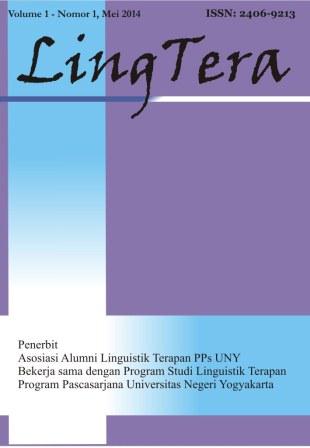Realisasi bentuk nominalisasi Bahasa Jerman pada novel ein Mann fí¼r Mama ke dalam Bahasa Indonesia
DOI:
https://doi.org/10.21831/lt.v8i2.13246Keywords:
realization, verb nominalization, adjective nominalization, German, bahasa IndonesiaAbstract
Penelitian ini bertujuan: (1) untuk mendeskripsikan bentuk nominalisasi bahasa Jerman dalam novel ein Mann fí¼r Mama, dan (2) untuk mendeskripsikan realisasi bentuk nominalisasi bahasa Jerman dalam novel ein Mann fí¼r Mama ke dalam bahasa Indonesia.Penelitian ini merupakan penelitian deskriptif kualitatif. Data penelitian ini adalah satuan lingual kalimat, klausa, dan frasa yang mengandung nominalisasi verba dan adjektiva bahasa Jerman dan padanannya dalam bahasa Indonesia yang terdapat pada novel ein Mann fí¼r Mama dan terjemahannya. Hasil penelitian sebagai berikut. (1) Bentuk nominalisasi verba bahasa Jerman dihasilkan melalui proses konversi dan penambahan afiks. Proses konversi tidak menggunakan afiks sebagai pembentuk nomina. Proses derivasi menggunakan afiks –ung. Sedangkan nominalisasi adjektiva bahasa Jerman dihasilkan melalui proses penambahan afiks, yaitu –e, -heit, dan –keit (2) Bentuk padanan nominalisasi verba dan adjektiva bahasa Jerman dan bahasa Indonesia dihasilkan melalui proses penambahan afiks yang menghasilkan padanan berbentuk nomina. Selain itu, terdapat pula bentuk padanan yang mengalami pergeseran kelas kata menjadi adjektiva, verba dan frasa.
The realization of German Nominalization in novel ein Mann fí¼r Mama into bahasa Indonesia
Abstract
This study aims to: (1) describe German nominalization form in the Novel "Ein Mann fí¼r Mama", and (2) to describe the realization forms of German nominalization in Novel Ein Mann fí¼r Mama into Bahasa Indonesia. This study refers to a qualitative study. The data involved are lingual unit sentences such are clauses dan phrases containing German verbs and adjective nominalization in Novel Ein Mann fí¼r Mama and its translation. The result is as follows. (1) German verb nominalization forms are generated through the conversion process and affixes. The conversion process does not use affixes as forming nouns. The derivation process uses affixes –ung. While German adjective nominalization is generated through the process of affixes addition, which are –e, -heit, and –keit (2) German verb and adjective realization in Bahasa Indonesia is generated through the affixes process that produces the equivalent form of the noun. In addition, there is also another form of realization in Bahasa Indonesia which are adjectives, verbs and phrases.
Published
How to Cite
Issue
Section
Citation Check
License
LingTera allows readers to read, download, copy, distribute, print, search, or link to its articles' full texts and allows readers to use them for any other lawful purpose. The journal allows the author(s) to hold the copyright without restrictions. Finally, the journal allows the author(s) to retain publishing rights without restrictions.
- Authors are allowed to archive their submitted articles in an open-access repository.
- Authors are allowed to archive the final published article in an open-access repository with an acknowledgment of its initial publication in this journal.

Psychology, Evaluation, and Technology in Educational Research is licensed under a Creative Commons Attribution-ShareAlike 4.0 International License.
Based on a work at https://petier.org/index.php/PETIER.









